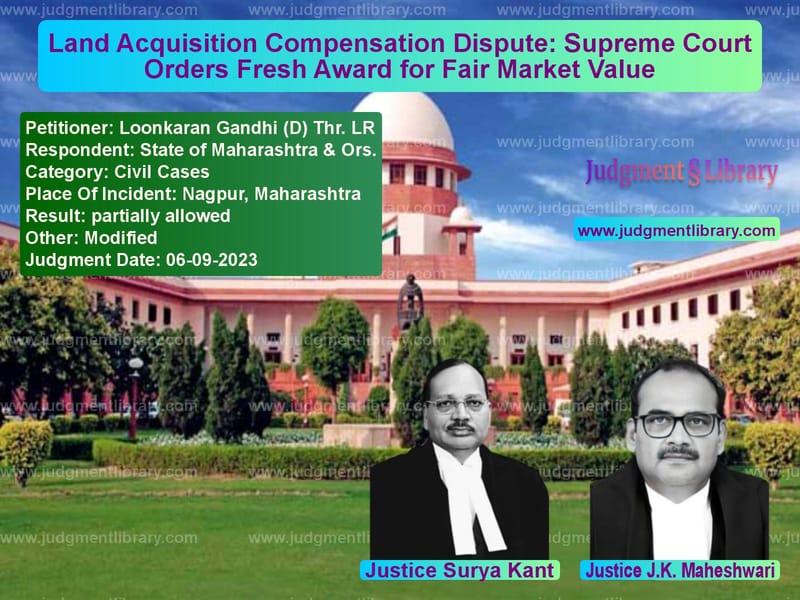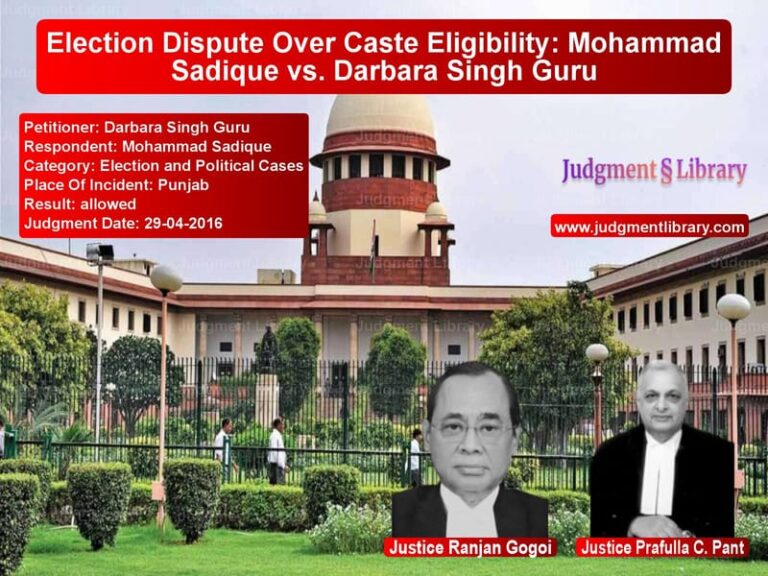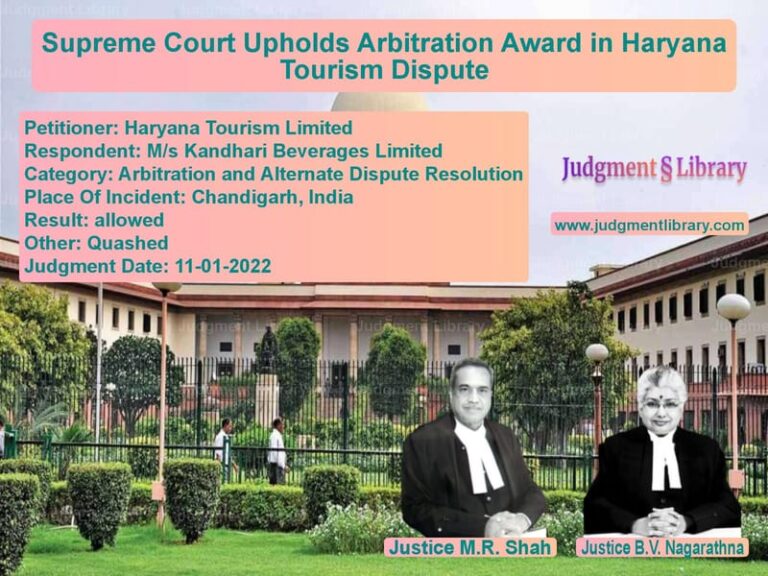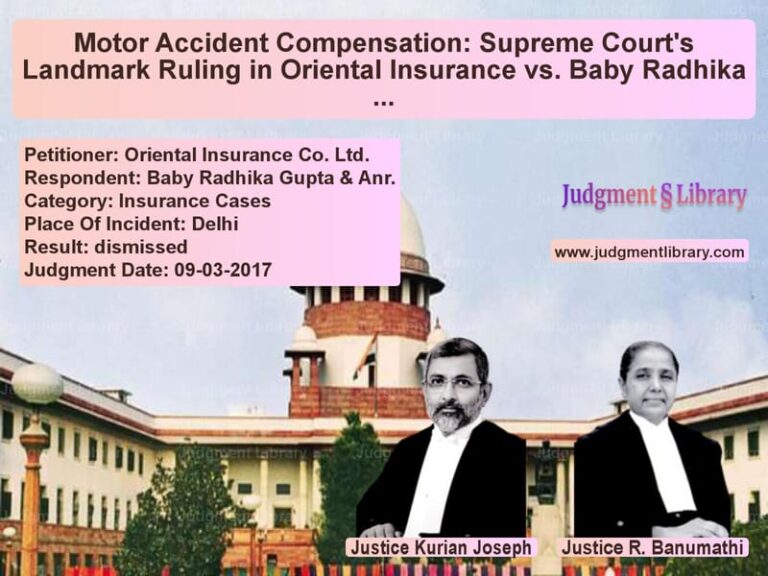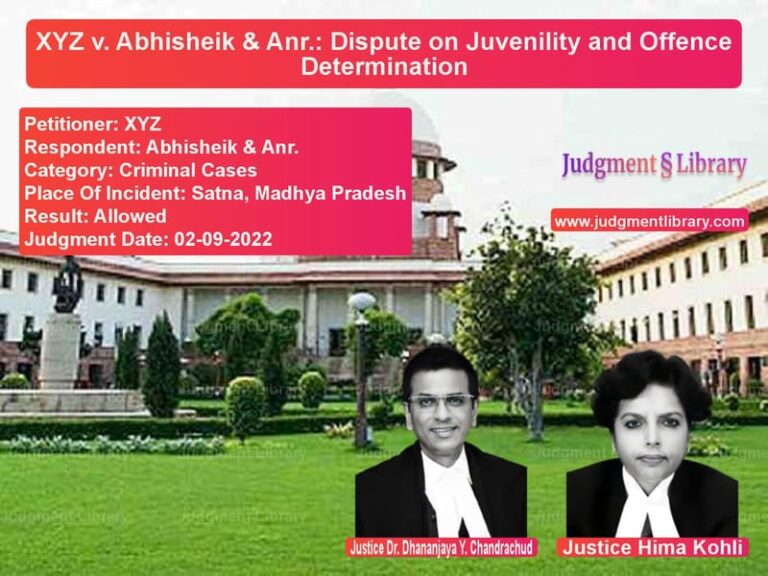Land Acquisition Compensation Dispute: Supreme Court Orders Fresh Award for Fair Market Value
The case of Loonkaran Gandhi (D) Thr. LR vs. State of Maharashtra & Ors. is a significant ruling on land acquisition and compensation, where the Supreme Court had to decide whether the petitioner was entitled to a fresh award at the market value of the land due to an inordinate delay in compensation payment.
Background of the Case
The dispute began with the acquisition of land in Mouza Khamla, District Nagpur, Maharashtra, owned by the appellant’s father. The land was acquired under the Nagpur Improvement Trust Act, 1936 (NIT Act) for the Ajni Street Scheme. Notifications for land acquisition were issued in 1962 and finalized in 1969. However, while possession of the land was taken in 1970, the compensation was not paid for decades.
The original writ petitioner (the landowner) had sought either compensation of Rs. 400-500 per sq. ft. for the land or an alternate plot of the same size. The Bombay High Court (Nagpur Bench), in 2009, directed the Nagpur Improvement Trust (NIT) to either allot an alternate plot or determine compensation by April 30, 2010. However, the authorities did not comply with this order.
Legal Issues Raised
The Supreme Court was called upon to decide:
- Whether the acquisition proceedings had lapsed due to the delay in compensation payment.
- Whether the petitioner was entitled to an alternate plot in the same vicinity.
- What should be the appropriate compensation given the significant delay.
Petitioner’s Arguments (Loonkaran Gandhi’s Legal Heir)
The appellant argued:
- The land acquisition process was flawed since the authorities had taken possession in 1970 but had not determined the compensation for over 50 years.
- The delay had caused immense financial and emotional hardship.
- Section 11-A of the Land Acquisition Act, 1894 (LA Act) mandates that an award must be passed within two years of the declaration. The delay should have resulted in the lapsing of the acquisition.
- Since an award was passed only in 2013, the landowner should be compensated based on market rates in 2013 instead of historical rates.
Respondent’s Arguments (State of Maharashtra & Nagpur Improvement Trust)
The respondents countered with:
- The acquisition was done under the NIT Act, which has a different framework from the LA Act. Therefore, the lapsing provision under Section 11-A of the LA Act does not apply.
- The petitioner was not entitled to an alternate plot as there was no provision for such an arrangement under the NIT Act.
- Awarding compensation at current market value was not feasible, as the acquisition was carried out decades ago.
Supreme Court’s Ruling
The Supreme Court delivered a landmark judgment addressing all key issues.
1. Lapse of Acquisition Proceedings
- The Court held that under the ruling in Nagpur Improvement Trust vs. Vasantrao (2002) and Bankatlal vs. Special Land Acquisition Officer (2014), Section 11-A of the LA Act does not apply to acquisitions under the NIT Act.
- Thus, the acquisition proceedings did not lapse despite the delay.
2. Rejection of Alternate Plot Claim
- The Court affirmed that since the NIT Act does not provide for compensation through alternate land, the rejection of this request by NIT was legally sound.
3. Determination of Compensation
- The Supreme Court held that given the delay of over 50 years in determining compensation, the petitioner must be compensated at the market rate prevailing on the date of the 2013 award.
- The authorities were directed to pass a fresh award based on 2013 market value rather than the rates applicable at the time of the original acquisition.
- The petitioner was also entitled to all statutory benefits under the LA Act, including solatium and interest, from the date of acquisition.
Final Judgment
The Supreme Court ruled:
- The land acquisition did not lapse.
- The petitioner was not entitled to an alternate plot.
- The compensation must be calculated as per 2013 market value.
- Statutory benefits (solatium, interest) should be provided from the date of acquisition.
- The award must be passed within four months, and the parties should appear before the authority on September 25, 2023.
Impact of the Judgment
The ruling reinforces key legal principles:
- Long delays in land acquisition do not invalidate proceedings, but they can impact compensation.
- Market value compensation is necessary for delayed awards, preventing unfair financial loss to landowners.
- Public bodies must follow due process and not withhold compensation indefinitely.
Conclusion
The Supreme Court’s decision in Loonkaran Gandhi vs. State of Maharashtra is a critical judgment that balances the state’s power of eminent domain with the landowner’s right to fair compensation. By ensuring that the compensation aligns with market values at the time of award determination, the Court has protected property rights and set a precedent for future land acquisition disputes.
Petitioner Name: Loonkaran Gandhi (D) Thr. LR.Respondent Name: State of Maharashtra & Ors..Judgment By: Justice Surya Kant, Justice J.K. Maheshwari.Place Of Incident: Nagpur, Maharashtra.Judgment Date: 06-09-2023.
Don’t miss out on the full details! Download the complete judgment in PDF format below and gain valuable insights instantly!
Download Judgment: loonkaran-gandhi-(d)-vs-state-of-maharashtra-supreme-court-of-india-judgment-dated-06-09-2023.pdf
Directly Download Judgment: Directly download this Judgment
See all petitions in Property Disputes
See all petitions in Landlord-Tenant Disputes
See all petitions in Contract Disputes
See all petitions in Damages and Compensation
See all petitions in Judgment by Surya Kant
See all petitions in Judgment by J.K. Maheshwari
See all petitions in partially allowed
See all petitions in Modified
See all petitions in supreme court of India judgments September 2023
See all petitions in 2023 judgments
See all posts in Civil Cases Category
See all allowed petitions in Civil Cases Category
See all Dismissed petitions in Civil Cases Category
See all partially allowed petitions in Civil Cases Category

